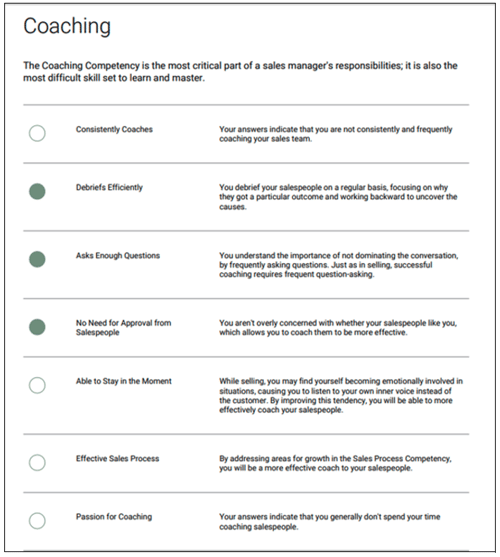Years ago, one of the lead execs from our client KeyBank shared an article called, “What it takes to be a Coach”. It began with: You must understand the game.
Many leaders do not understand that the ‘game’ is the game of selling. Managers and internal trainers must really understand the game of selling. It takes strapping a headset on, making hundreds of dials, asking for introductions, getting rejected, selling big cases and starting with small sales, to really understand the game. Otherwise, it is like taking flying lessons from a pilot trainer that did all their flight learning in a simulator.
Most sales managers end up in that role because they were good to great salespeople and the company was looking to:
- Replace a manager
- Find a way for professional advancement
- Look for a way to keep a salesperson that is slowing down and has a ‘book’ of business
Rarely if ever does that person go through an intense, fully integrated sales management training development program to help them effectively execute the required skills of an effective coach. Nor do they have a good handle on “what” to do; the sales coaching best practices. The 7 critical coaching competencies from Objective Management Group, our sales evaluation partner and pioneer in the industry, are listed below. How effective are your sales leaders at executing these activities?

Peter Jensen is an Olympic coach from Canada and author of the book “The Third Factor”. Peter states that first two factors for success in anything are nature and nurture. The Third Factor, specific to coaching, is: You must have a coaching bias.
A strong sales leader must have the coaching bias and they must love to coach the game of selling. They must have a love for seeing and hearing people develop into the best versions of themselves. That is what it takes to be successful at coaching. It must be about helping others gain the spotlight, success and financial rewards or a job well done. It requires sacrificing ego and the need to be right for the other person to discover their path, develop their skills and become the expert.
The challenge for most sales managers or sales leaders is to have the ability to exhibit and execute these skills of being a strong leader: Strong identity, self-assurance, credible authority, knowledge and a foundational vision, mission and goal orientation. Strong leaders do not need to be in the spotlight, do not act like they know it all and ask questions instead of always providing answers. These are the important sales coaching best practices that drive effective sales coaching.
There are assessments in the marketplace to help people identify if they have what it takes. We use Objective Management Group’s Sales Manager Insights Evaluation. Three key findings are identified and scored:
- The Will to Manage
- The Sales Manager Sales DNA
- The Sales Manager Tactical Competencies
The evaluation provides an index percentage that tells the evaluated sales manager how they rank against others who have taken the evaluation. Our 30+ history has verified that most sales managers have less than 10% of the skills needed to be an effective sales coach.
In summary, most companies with a manager level in their organization fail to get their salespeople to perform for one of the following reasons:
- The manager doesn’t have what it takes- the skills to be effective at sales coaching
- The manager doesn’t take the time or doesn’t have the bandwidth to handle the job, maintain a book of business, take care of operations and anything else that might be in the job description
- There isn’t a consistent ‘Sales Managed Environment’ to execute to so day in and day out, it’s an inconsistent coaching process.
Do your sales leaders understand the game of selling and have the coaching bias that can make them and effective coach?


